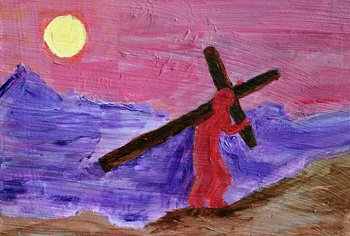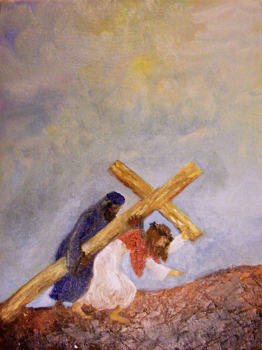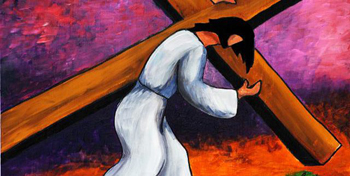For Sunday August 30, 2020
Lectionary Readings (Revised Common Lectionary, Year A)
Jeremiah 15:15-21
Psalm 26:1-8
Romans 12:9-21
Matthew 16:21-28
Part of me flinches away from our Gospel reading this week. I don’t feel up to writing about suffering and loss, about denying ourselves and taking up our crosses, about losing our lives in order to save them. During these days that feel apocalyptic already, I wish I could focus on a more soothing passage of Scripture. “Come to me, all who are weary and heavy laden,” or, “He leads me besides the still waters,” or, “Peace I leave with you; my peace I give to you.” But no. This is exactly the pivot we can’t make in response to this week’s Gospel; it’s the pivot Peter makes and regrets. Somehow, even during the painful, frightening days we find ourselves in, Jesus’s “bad” news is the Good News.
As Matthew describes the scene, Jesus has just praised and blessed Peter for recognizing him as the Messiah. Now Jesus begins to show his disciples that the Messiah must undergo great suffering at the hands of the elders and chief priests and scribes, be killed, and on the third day be raised.
Standing on this side of resurrection history, we can’t easily imagine the effect these words must have had on Jesus’s disciples. After all, we’re used to worshipping in front of a crucifix; we cross ourselves without thinking, or wear tiny replicas of Jesus’s crucifixion around our necks. But what would happen, I wonder, if we shook ourselves out of our familiarity for a few minutes, and heard Jesus’s words as his first listeners heard them two thousand years ago?
The disciples’ great hope, cultivated over the three years they followed Jesus, was that he would lead them in a military revolution and overthrow their Roman oppressors. They had seen his miracles, and witnessed firsthand his charismatic ability to draw adoring crowds. They had heard him proclaim aloud the arrival of a new kingdom. He was their longed-for future. Their cherished dream. Their chance at liberation.
So what could be more disorienting, more ludicrous, than the news that their would-be champion was determined to walk straight into a death trap? To give himself over not only to severe physical pain, but to humiliation and disgrace? To surrender without a fight to a common criminal’s death?
 |
You know the rest of the story. Peter, eager and clueless as ever, scolds Jesus for his macabre prediction. And Jesus, in what might be the sharpest and most surprising rebuke in all of Scripture, puts Peter in his place with one swift stroke: “Get behind me Satan! For you are setting your mind not on divine things but on human things.” Then Jesus turns to the crowds and captures the essence of his Gospel message in two sentences: “If any want to become my followers, let them deny themselves and take up their cross and follow me. For those who want to save their life will lose it, and those who lose their life for my sake, and for the sake of the gospel, will save it.”
I don’t know about you, but I can relate very well to Peter’s unease about this hard, hard teaching. Even now, centuries removed from the context in which Jesus lived and taught, I shiver as I consider the implications of his words. What exactly was he saying to his followers? What is he saying to us? That he wants us to pursue suffering and death? That a holy life is not about living at all, but about dying?
My temptation as I read this passage is to minimize what it asks of me. “Sure, okay, I’ll deny myself Facebook and Instagram for a few months,” I tell myself. “I’ll pray more, study more, tithe more, volunteer more.” “I’ll attend online church every Sunday until the pandemic ends, even though I’m sick of Zoom and YouTube.”
All good and worthy things, no doubt. But not, I think, what Jesus meant when he invited the crowds to lose their lives for the sake of the gospel. Not what he rebuked in the strongest possible terms when Peter tried to avoid Jesus’s cross with a cozy shortcut.
My other temptation is to maximize in the opposite direction. To become, as the expression goes, “so heavenly minded that I’m no earthly good.” This is the kind of self-denial that strips life of all pleasure, all delight, all celebration, and all joy. The single-mindedness that reduces the world to a grim mission field, a landscape to conquer with an earnest but ultimately loveless zeal. It is the dangerous kind of self-denial that sees ideology before it sees humanity. The kind of "sacrifice" that encourages people to stay in abusive relationships, and perpetuate their own victimhood. The kind of devotion that mistakes austerity for piety. I don’t believe that this is what Jesus meant, either. Certainly, I can’t recognize austerity in the Jesus who frolicked with children, the Jesus who turned water into wine, the Jesus who advocated for the widow, the orphan, the prisoner, and the outcast.
 |
So what then? What does it mean to deny myself? Living, as I do, in a culture that doesn’t torture and kill Christians for their faith, how shall I deny myself so that the gospel might thrive, here and now? How shall I save my life by losing it for Jesus’s sake in 21st century America?
Right now, I am asking myself these questions in the context of a global pandemic that shows no signs of letting up. I am asking in the context of police brutality, white supremacy, racial injustice, and gross economic inequality. I am asking in the context of global warming, mass extinction, droughts, and heat waves. I am asking in the context of the fires destroying forests and towns just twenty miles from where I sit right now, typing this essay.
So the question becomes this: where do I locate myself amidst these crosses? What am I willing to lose in these times? What do I stand to gain?
The uncomfortable truth is that I live in such crippling fear of suffering and death that I waste a huge amount of my mental, spiritual, and physical energy each day trying to stave off both. To be fair, contemporary western culture encourages me to do this. What would Jesus say, I wonder, to the multi-million dollar industries that invite me to deny my mortality through cosmetics, fashion, leisure, sex, entertainment, real estate, sports cars, weight loss, and beauty? What would he say to a culture that glorifies violence but cheapens death? What would he say to a global corporate economy that rapes and pillages the planet, instead of stewarding it with gentleness and care? What would he say to a notion of personal liberty that encourages me to revel in my “rights,” instead of shouldering my civic responsibilities? What would he say to my frightened heart, that prioritizes self-protection over so much else that matters in this life?
What if Jesus’s call is for us to stop clutching at this life so desperately? To step out of the vicious cycles of denial, acquisition, terror, and violence that seek to cheat death, but in fact rob us of the abundant life Jesus came to give us? What would it look like, in this time and place, to lay down our fears so that others might live? To willingly set aside our own interests and (dare I say it?) our own liberties, so that we can prioritize what Jesus called the "great commandments:" to love God and love our neighbors as ourselves?
To take up a cross as Jesus did is to stand, always, in the center of the world’s pain. Not just to glance in the general direction of suffering and then sidle away, but to dwell there. To identify ourselves with those who are aching, weeping, screaming, and dying. To insist that our comfort isn't worth it unless the least and the lost can share in it, too.
Taking up the cross means recognizing Christ crucified in every suffering soul and body that surrounds us, and pouring our energies and our lives into alleviating their pain — no matter what it costs. It means accepting — against all the lies of my culture — that I will die. It means following up that courageous acceptance with the most important question I can ask: given my inevitable death, how shall I spend this brief, singular, God-breathed life?
Shall I hoard it in fear, or give it away in hope? Shall I protect myself with numbness and apathy, or experience the abundant life Jesus offers to those who ache, weep, and bleed alongside the world’s suffering? Shall I, like Peter, push suffering away at all costs — and in doing so, push Jesus away, too? Or shall I accompany the one I call Savior down the only road that actually leads to eternal life?
 |
For those of us who've grown up in the Church, the actual scandal and strangeness of Jesus’s death has perhaps long faded away. But here’s the bottom line: God died. And not only that: God died the humiliating death of the unjustly accused. The death of the lethal injection. The death of the electric chair. The death of the lynching tree.
Jesus willingly took the violence, the contempt, the apathy, and the arrogance of this world, and absorbed them all into his body. He chose to be the victim, the scapegoat, the sacrifice. He refused to waver in his message of universal love, grace, and liberation, knowing full well that the message would cost him his life. He declared solidarity for all time with those who are abandoned, colonized, oppressed, accused, imprisoned, beaten, mocked, and murdered. He burst open like a seed so that new life would grow and replenish the earth. He took an instrument of torture and turned it into a vehicle of hospitality and communion for all people, everywhere. He loved and he loved and he loved, all the way to the end.
Jesus rebukes Peter so harshly in this week’s Gospel precisely because the temptation Peter holds out is so alluring, so deceptive, and so insidious: “You don’t have to do the hard thing. You don’t have to take this faith business so seriously. You don’t have to give up your own rights, privileges, and comforts. You don’t have to die.”
No, we don’t. It’s true. There is a spectator version of Christianity out there, and plenty of people decide to live it. But let’s not pretend for one moment that it’s the version Jesus calls us to. Let’s not fool ourselves into assuming that faith-on-the-sidelines will grant us safety, immunity, joy, or blessing. It will not. Those who save their lives will lose them. Those who lose their lives will save them. That’s the truth Jesus vindicated when he died and rose from the grave. We can take it or leave it.
Debie Thomas: debie.thomas1@gmail.com
Image credits: (1) Fine Art America; (2) Lightworks Arts: Art & Design by Kimberly Tink; and (3) McLaurin Memorial Baptist Church, Edmonton, Alberta, Canada.





